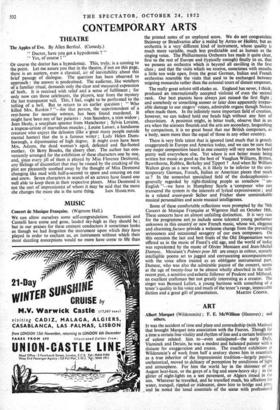MUSIC
Concert de Musique Francaise. (Wigmore Hall.) WE can allow ourselves some self-congratulation: Toscanini and Cantelli have come and gone, lauded sky-high as they should be - but in our praises for these eminent conductors it sometimes looks as though we had forgotten the instrument upon which they have played in order to enchant us, an instrument without which their most dazzling conceptions would no more have come to life than the printed notes of an unplayed score. We do not congratulate Steinway or Stradivarius after a recital by Arrau or Heifetz, but an orchestra is a very different kind of instrument, whose quality is much more variable, much less predictable and as human as the singing voice. The Philharmonia Orchestra has made it quite clear, first to the rest of Europe and (typically enough) finally to us, that we possess an orchestra which is beyond all cavilling in the first class ; and that the visits which we receive, sometimes with mouths a little too wide open, from the great German, Italian and French orchestras resemble the visits that used to be exchanged between reigning monarchs rather than the colonial tours of distant emperors.
The really great soloist still eludes us. England has never, I think, produced an internationally accepted violinist of even the second rank. Our best pianists have always just missed the first flight ; and somebody or something sooner or later does apparently irrepar- able damage to our singers' voices, admirable organs though Nature often made them. In the infinitely more important field of creation, however, we can indeed hold our heads high without any hint of chauvinism. A pessimist might, in bitter truth, observe that in an era when the sciences flourish and the arts are secondary, languishing by comparison, it is no great boast that our British composers, as a body, seem more than the equal of those in any other country.
There is very little talent that is ignored (and much that is grossly exaggerated) in Europe and America today, and we can be sure that any major composition heard in one country will very soon be heard pretty well everywhere else. Yet where is not better music being written but music as good as the best of Vaughan Williams, Britten, Rawsthorne, Rubbra, Berkeley and Tippett ? And when Sir William Walton gives us a new work, is it likely to be inferior to the con- temporary German, French, Italian or American pieces that reach us ? In the somewhat specialised field of the dodecaphonists- generally regarded by right-thinking people as somehow " un- English "—we have in Humphrey Searle a -composer who can transcend the system in the interests of lyrical expressiveness • and in a related avant-garde Seiber and Fricker show unmistakable musical personalities and acute musical intelligences.
Some of these comfortable reflections were prompted by the 74th Concert de Musique Frangaise at Wigmore Hall on October 18th. These concerts have an almost unfailing distinction. It is very rare for the programme not to include some talented young performer unknown in this countri or new French music, whose wit, elegance and charming facture provide a welcome change from the prevailing seriousness and occasional savagery of our own composers. On this occasion the last and best fruits of the Old Dispensation were offered us in the music of Faure's old age, and the world of today was represented by the music of Olivier Messiaen and Jean-Michel Damase. Messiaen's Poemes pour Mi are essays in colour, scarcely intelligible poems set to jagged and corruscating accompaniments with the voice often treated as an obbligato instrumental part. Damase, who was also the admirable pianist of the concert, seems at the age of twenty-four to be almost wholly absorbed in the still- recent past, a sensitive and eclectic follower of Poulenc and Milhaud, an excellent craftsman bet not greatly interesting as a creator. The singer was Bernard Lefort, a young baritone with something of a tenor's quality in his voice and much of the tenor's range, impeccable diction and a great gift of presentation. MARTIN COOPER.


































 Previous page
Previous page